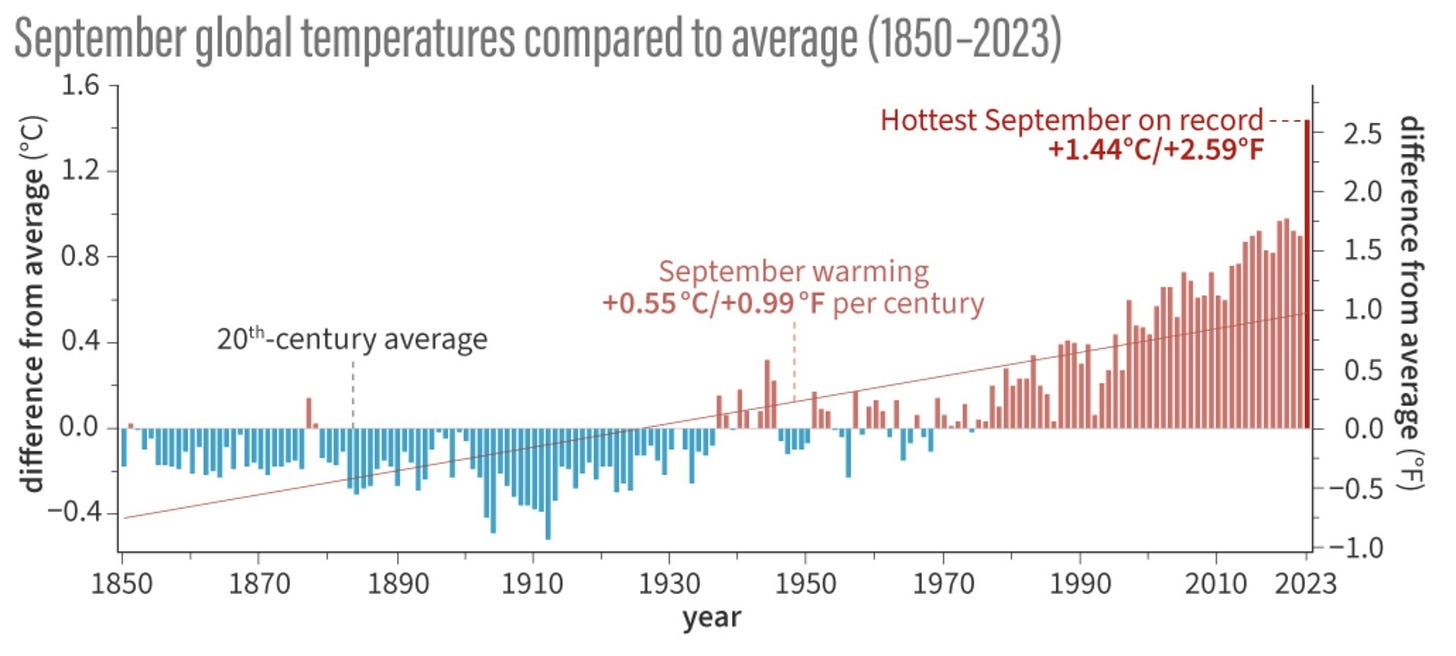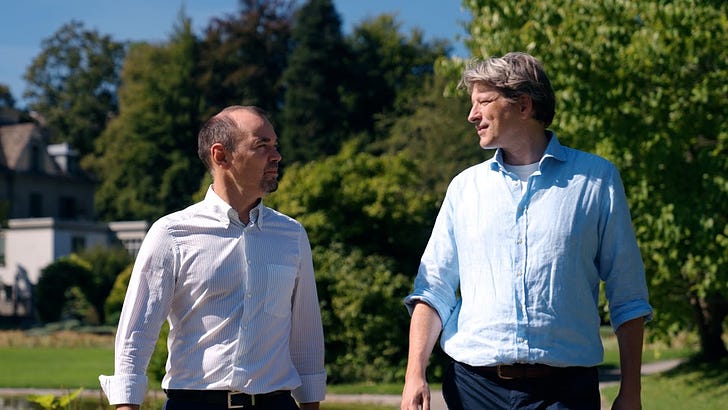For many years, I have worked on climate change-related issues as a diplomat, public speaker, or publicist, often focussed on potential impacts, especially risks to human and international security. At the start of COP28, I will take a different approach and give a general overview of what is happening to our warming planet. There is likely a lot you already know, and today, the newspapers are filled with climate change articles detailing every aspect of the climate crisis. Still, I believe it is good to go back to basics occasionally for any relevant subject.
So, let's start with the COP. In the next few days, there will be more than usual attention in the media for climate change. After December 2, it will become less, only to pick up more around December 12 and 13. You will recognize the pattern from previous years; it is the time of the annual Conference of Parties of the UN Climate Treaty. In UN-speak, this is known as COP28 of the UNFCCC, The United Nations Framework Convention on Climate Change, the "UNF-triple C".
70,000 participants
At COP28, all 198 countries that signed the UNFCCC will meet. Over the years, this annual event seems to have grown even faster than the greenhouse gas emissions it tries to limit. You may ask if this meeting requires 70,000 people to fly into Dubai. Mainly since only a tiny percentage of those visitors participate in the negotiations. The rest is lobbying, networking, talking at gatherings in the many pavilions, or even -as rumors have it- blatantly negotiating new fossil fuel extraction contracts. The number of representatives of the oil and gas industry will undoubtedly be larger than many delegations of countries who will drown and disappear from the world map because of the rising sea level resulting from greenhouse gas emissions.
My last COP was COP22. Since then, I have been asked to participate every year and have always decided not to go. That is not because I chose to never join anymore; it is just that I consider each time if my positive contribution to solving climate change at such a meeting outweighs my negative contribution by burning kerosene to get there. I'll go again when I feel my presence there is worth it. I hope the other 70,000 (minus the oil lobbyists exempted from moral considerations) will make the same careful consideration each year before buying their plane tickets.
Your heated experiences
You will probably have noted that our planet is warming, and you surely can't have missed the changing weather patterns. You may have experienced these changes in your daily lives and will have seen increasing examples of extreme weather in other countries in the media.
This summer was the Earth's hottest since global records began in 1880. From my perspective here in Ottawa, I shared with you early in the year that the Rideau Canal, the biggest skating rink in the world, was closed to skaters for the first time. I also wrote about the massive wildfires all over Canada, breaking all previous records. But I am sure you will have your stories of climate change-related extremes to tell from your perspective. For the bigger picture, look at this short video from NASA.
I'm not sure if there is a word in English for extreme extremes, but if I can think of one, I would apply it to the worldwide temperature anomaly for September. Have a look at the last data, on the right, in this graph:
According to NOAA Chief Scientist Dr Sarah Kapnick, September 2023 was so absurdly hot that it was warmer than the average July temperatures from 2001-2010. And it fits in a pattern because it was the fourth month in a row of record-warm global temperatures.
What’s at stake?
I have written in these newsletters about what is at stake when the world warms up, and although we are just at the beginning, we see a sharp increase in extreme weather, heatwaves, droughts, floods, or forest fires that are easy to film and share in the media. Many other impacts of excessive burning of fossil fuels are less straightforward to put on video and are therefore less known.
For instance, a new study suggests that air pollution from using fossil fuels in industry, power generation, and transportation accounts for 5.1 million avoidable deaths a year globally. I have seen other studies before, and the numbers are not always the same, but reducing the leading cause of climate change, greenhouse gas emissions, will save millions of lives through cleaner air.
There is also a lot of change on our planet at locations we don't see because we don't live there. We don't see the species in the oceans moving away from the equator, and we don't see the melting of the ice sheets in Greenland or the Antarctic, where the world's largest iceberg has just broken free of the continent; it has about the size of the state of Rhode Island, but I assume it won't reach the front pages of the newspapers, except when it drifts within sight of Manhattan.
Taking stock
We are now about midway between COP21 in Paris, where in late 2015, the Paris Agreement was concluded and the targets set for 2030. It was a landmark decision about keeping the global average temperature rise to 'well below' 2 degrees Celsius and pursuing efforts to limit the increase to 1.5 degrees Celsius above pre-industrial levels. Never before did a binding agreement bring all nations together to combat climate change and adapt to its effects.
And since we are about midway between these crucial dates, it is time to take a moment (that is a two-year process in UN terms) to look at the progress made. COP28 marks the end of the first global stocktake, an operation critical to assessing collective progress under the Paris Agreement and addressing opportunities for enhanced action and support.
Warnings
The best time to act lies years behind us, but the second best time to take action is now. The world's best climate scientists and the UN Intergovernmental Panel on Climate Change warned that crossing the 1.5°C threshold risks unleashing far more severe climate change impacts, including more frequent and severe droughts, heatwaves, and rainfall. Any climate-related disasters you have recently seen are just warming us up to the idea of living on a genuinely heated planet. Many of us believe this appetizer was enough of a warning and we should avoid the main course of the menu that climate change has in store for us.
Unfortunately, our leaders, with their preference to postpone harsh decisions and a willingness to listen to the fossil fuel interests, have raised the challenge simply by doing too little too late. Instead of gradually phasing out fossil fuels, the world now faces a daunting challenge. To limit global warming to 1.5 degrees Celsius, greenhouse gas emissions must peak before 2025 at the latest and decline 43 percent by 2030. I'm not too worried about missing the peaking in one or two years; the challenge lies in how steep we can steer down our trajectory once we have reached the peak.
As I often wrote before, it's more than anything a question of political will.
If you got this far, please read this too:
I write this newsletter because I believe that together we can do better on this beautiful but fragile planet.
If you are a paying subscriber: thank you for your support!
If you are not, please consider supporting this initiative by taking a paid subscription.
When Emissions Soar, Temperatures Rise, and Leaders Fall Short
This year's summary of all I wrote about climate change would likely be: higher emissions, higher temperatures, and more extreme weather, while we lack leaders in climate action. That summary sounds like today's UN report: "Greenhouse gas emissions hit new highs, temperatur…
The Renewable Energy Interview at Swiss Re
I'm excited to share with you the second of three videos I made with Swiss Re about the impact of climate change on the Camino de Santiago and how to deal with the new challenges posed by global warming. Some of you may have seen it already on the platform that we fondly used to call Twitter.










Very just ! And it is very regrettable that political issues, of power, or money, ultimately take precedence over the issues of fighting the climate crisis!
70,000 participants!
A number that makes the dizzy...
Your conclusion is very important, whatever this figure of 70,000 is,
"it is above all a question of political will".
And for this, it seems necessary to have direct links between representatives of the scientific community and decision-makers to explain to them the measures to be taken with the sole aim of combating global warming.
Are all 70,000 people really necessary to shed light on these debates?
And explain to decision-makers the « practical measures » that can help achieve the essential objectives against climate change ?